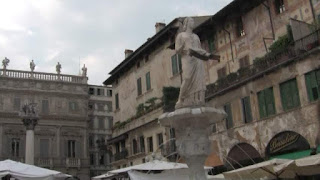“There is no world without Verona walls,
But purgatory, torture, hell itself.
Hence-banished is banish'd from the world,
And world's exile is death."
Those were the words of Romeo about Verona, in the play Rome and Juliet by Shakespeare. He
preferred to die rather than to be exiled and leave Verona. Because within the
walls of Verona lived Juliet, the love of his life, for him life without her is
like death. That is the theme of the play, about love and death.
Nowadays, the city is still considered as the hometown of
Romeo and Juliet, Verona is the stage of the famous tragic play. The most
famous spot in the city is the Casa di Giulietta, or Juliet’s House, located on
Via Capello. As the story goes, this was the home of the Capulet family,
Juliet’s family . It is here Juliet would have lived, and today it is a museum
dedicated to her. The interior contains the furniture of a typical fourteenth
century aristocratic household, enhanced by a wide range of medieval ceramics.
From the courtyard, we can see the famous balcony in the
world—Juliet’s balcony. It is a tiny balcony where Juliet stood while Romeo
declared his love. It is also the balcony where Romeo and Juliet planned the
events that led to their tragic deaths. In the courtyard, the walls now are covered
by love notes, written in many languages by visitors from all around the world.
They believe if they write here, it will cast a lucky spell and their love will
be eternal.
But, Romeo and Juliet’s life themselves were overshadowed by
terrible fate. From the opening prologue it says that they will die, Romeo and
Juliet are trapped by fate. Had Romeo not met
Benvolio on the very day of the Capulets’ ball, Romeo would not have met
Juliet. Had friar Lawrence's messenger to Romeo not detained, who would have
explained the plan by which Juliet was to pretend death, Romeo would have got
the message. And had Romeo arrived just a few moments before Juliet wakes-up,
Romeo would not have taken his own life.
It is their misfortune that leads to the sorrowful and tragic ending of
the play. But, it is Romeo and Juliet's fiery passion of their love which makes
their love eternal.
In the center of the internal court stands a bronze statue of
the beautiful and faithful Juliet, by Nereo Costantini. According to legend, touching Juliet’s right
breast will bring good luck in love. However, the affectionate gesture has
brought bad luck to the statue. The repeated touching by tourists, newly weds,
school boys, couples, has created large holes on the statue’s right breast,
wrist and arms, and the holes are widening. Many people desperately inserted
love notes and padlock keys through the cracks in the arms and breasts of the
statue, in hope for luck in their love affairs.
The original statue then was removed, restored and placed inside
Juliet's House in 2014, in order to protect it from damages. Now a replica has been installed back in the courtyard of
Juliet's House.
So Verona, a city on the Adige river in Veneto, continues to
be the City of Love, It enshrines a myth that gently comes alive again across
the medieval squares, through the alleys and shadowy courtyards. Here it’s easy to fantasize about stories,
figures, characters and events of the play. Romeo and Juliet’s myth is the
trail of a dream. Love is the overriding theme of the play. Based on that theme
the Verona Tourist Office wrote: ‘Se Ami Qualcuno Portarlo a Verona’ which means
‘If you love someone then take them to Verona’.
THE END




